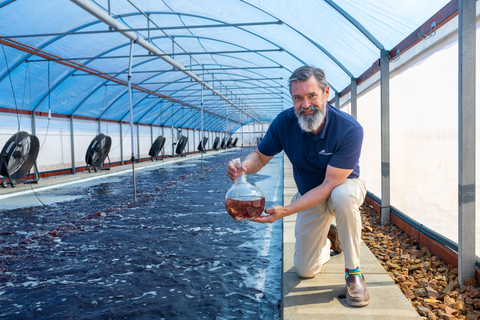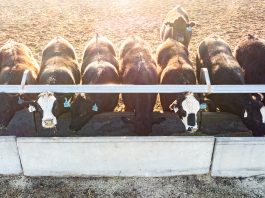In a groundbreaking move for sustainable agriculture, CH4 Global has officially commenced production at the world’s first commercial-scale Asparagopsis cultivation facility.
Located in Louth Bay, South Australia, the newly launched EcoPark represents a transformative step in making seaweed-based methane reduction solutions both accessible and economically viable for the livestock industry.
CH4 Global CEO and Co-Founder Steve Meller, PhD, said: “The opening of this facility lays to rest any doubt about whether Asparagopsis production can be scaled to meet commercial demand.
“We’ve cracked the code on making methane-reducing feed supplements commercially viable without requiring government subsidies – a crucial step in scaling this important climate solution.”
Revolutionising Asparagopsis cultivation
The EcoPark’s innovative pond-based cultivation system marks a significant departure from traditional methods, offering a cost-effective approach to producing Asparagopsis at scale.
Unlike conventional tank-based systems, which have historically driven up production costs, CH4 Global’s method reduces expenses to just one-tenth of previous models.
This breakthrough allows the company to offer its Asparagopsis-based Methane Tamer™ cattle feed supplement at a competitive price, benefiting the entire agricultural value chain.
Scaling up to meet global demand
The facility’s initial phase includes 10 large-scale cultivation ponds, boasting a combined capacity of 2 million litres and an annual production output exceeding 80 metric tons of Asparagopsis.
Over the next year, CH4 Global plans to expand the facility to include 100 ponds capable of producing enough seaweed to support 45,000 cattle per day.
Looking ahead, with additional investment, the EcoPark could eventually house 500 ponds, further scaling production to meet the increasing demand for methane-reducing livestock feed supplements worldwide.
Meller added: “With the EcoPark, CH4 Global now has more production capacity than all other producers combined, putting us in a unique position to meet growing market demand.
“The simple fact is that natural Asparagopsis is the safest, most effective way to reduce methane emissions from cattle, and our cost efficiencies mean farmers can now realise a net economic benefit while significantly reducing their carbon footprint. This is how you drive rapid adoption of climate solutions.”
A cost-effective and sustainable approach
CH4 Global’s pond-based cultivation model offers several key advantages over existing methods:
- Lower capital costs: 90% lower than traditional tank-based cultivation.
- Improved efficiency: Polytunnel systems precisely control growing conditions for optimal yield.
- Reduced contamination risks: Unlike ocean-based harvesting, the controlled environment minimises variability and weather disruptions.
- Year-round harvesting: Multiple harvest cycles per year optimise output.
- Energy efficiency: Strategic placement in temperate zones lowers energy costs.
Combatting climate change with Asparagopsis
Methane is a potent greenhouse gas with over 80 times the warming potential of carbon dioxide over 20 years.
With agriculture responsible for approximately 30% of human-driven methane emissions, innovative solutions like Methane Tamer™ could play a crucial role in mitigating climate change.
CH4 Global estimates that if just 10% of the world’s cattle were fed Asparagopsis-based supplements, the resulting methane reduction would be equivalent to removing 100 million cars from the road.
As global pressure to curb agricultural emissions intensifies, CH4 Global’s EcoPark marks a significant step toward a more sustainable livestock industry.
By pioneering cost-effective Asparagopsis cultivation, the company is paving the way for widespread adoption of methane-reducing feed solutions, offering a scalable and impactful tool in the fight against climate change.




